Epidemiological situation in Yemen: diphtheria
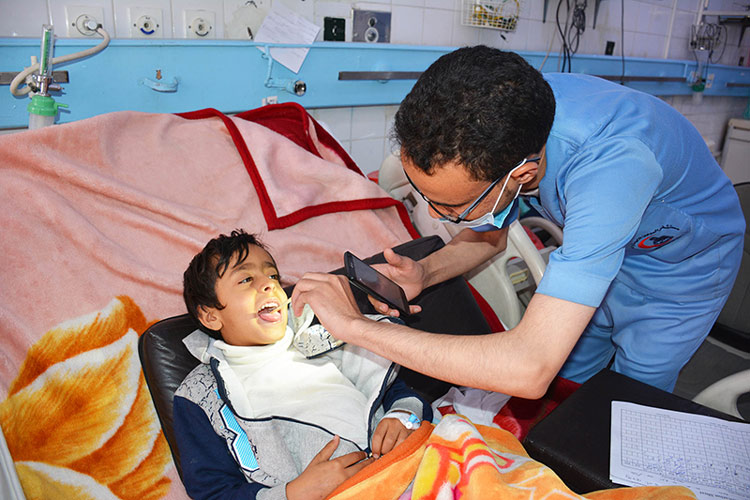
16 November 2023, Sana’a, Yemen – Reports of diphtheria cases in Yemen (to 14 October 2023) are 57% higher than in 2021 and 2022. Cases have risen gradually since 2021, with a significant increase noted in 2023.
So far this year, 1671 suspected diphtheria cases have been reported in the country, with 109 associated deaths, compared with 1283 cases reported in the whole of 2022. Diphtheria is typically a winter illness, so the increase in cases noted from June to September 2023 marks a change from the usual seasonal pattern.
In response to the current increase in cases, WHO is working to supply Yemen’s Ministry of Public Health and Population with an urgent quantity of 2200 vials of diphtheria antitoxin, which will be distributed to the most affected areas. Due to the complexities of the Yemen situation, however, only 220 vials have been delivered to date, whereas the global shortage of diphtheria antitoxin affects its availability and increases prices.
“The 2200 doses that WHO has secured are only enough to treat 300 severe patients, which is inadequate to address the issue,” said Dr Arturo Pesigan, WHO Representative in Yemen. “It is projected that in 2024 multiple ongoing and growing outbreaks of vaccine-preventable diseases – including diphtheria – will persist, with the proportion of unvaccinated, or zero-dose, children reaching 28%. The funding shortage and issues of inaccessibility are affecting the health and lives of vulnerable people in Yemen.”
Among children in Yemen, there has been a significant drop in immunization rates and a correlated increase in cases of vaccine-preventable diseases. This decline in coverage continues to worsen owing to economic deterioration, low incomes, displacement, and overcrowded living conditions in camps, coupled with an overstretched health system and chronic funding shortage. Millions of children cannot be reached by routine immunization activities, and suspected cases of vaccine-preventable diseases have risen to unprecedented levels.
WHO continues to monitor and analyse outbreak trends and reported cases on a weekly basis, to ensure a full understanding of the epidemiological situation for various circulating outbreaks.
About diphtheria
Diphtheria is an infection caused by the bacterium Corynebacterium diphtheriae. Signs and symptoms range from mild to severe and often come on gradually, with a higher mortality rate among unvaccinated younger children. In severe cases, the bacteria produce a poison (toxin) that causes a thick grey or white patch at the back of the throat that can block the airway, making it hard to breathe or swallow.
The toxin may also get into the bloodstream, causing complications that may include inflammation and damage of the heart muscle, inflammation of nerves, kidney problems and bleeding problems. The damaged heart muscle may result in an abnormal heart rate and inflammation of the nerves may result in paralysis.
For more information on Yemen’s health situation, visit: Yemen Health Emergency
For more information on diphtheria, visit: Diphtheria Questions and Answers
Media contacts: WHO Yemen Communications,
About WHO
Since 1948, the World Health Organization (WHO) has been the United Nations agency dedicated to advancing health for all, so that everyone, everywhere can attain the highest level of health. WHO leads global efforts to expand universal health coverage, direct and coordinate the world’s responses to health emergencies and connect nations, partners and people to promote health, keep the world safe and serve the vulnerable.
Yemen struck by Tropical Cyclone Tej as its health system struggles to cope
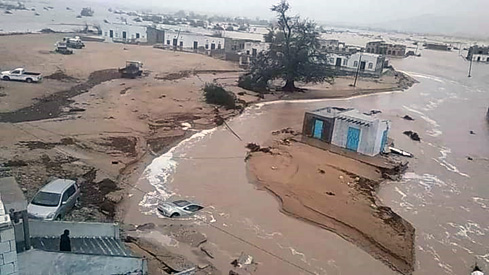 An image of the impact of Tropical Cyclone Tej on Huswain District, Al Mahrah Governorate, Yemen, taken on 24 October 2023. Photo credit: Emergency operations centre, Al Mahrah Governorate29 October 2023, Sana’a, Yemen – Tropical Cyclone Tej hit Yemen’s eastern coast areas of Al Mahrah Governorate and Socotra archipelago on 23 and 24 October 2023. As of 24 October, the storm moved towards the eastern regions of Hadramout Governorate. The affected areas experienced heavy and torrential rains that led to major damage to infrastructure including health facilities, roads, telecommunications lines and electricity.
An image of the impact of Tropical Cyclone Tej on Huswain District, Al Mahrah Governorate, Yemen, taken on 24 October 2023. Photo credit: Emergency operations centre, Al Mahrah Governorate29 October 2023, Sana’a, Yemen – Tropical Cyclone Tej hit Yemen’s eastern coast areas of Al Mahrah Governorate and Socotra archipelago on 23 and 24 October 2023. As of 24 October, the storm moved towards the eastern regions of Hadramout Governorate. The affected areas experienced heavy and torrential rains that led to major damage to infrastructure including health facilities, roads, telecommunications lines and electricity.
In Al Mahrah Governorate, severe weather conditions and damage to roads hindered access to rescue stranded people and protect lives. Information about the situation remains limited but efforts are under way by local authorities and partners to access affected areas. Yemen’s health system is already overburdened with the direct impact of 9 years of conflict. Health facilities lack specialized doctors, medical supplies, and adequate infrastructure to address the most basic needs.
According to the United Nations Office for the Coordination of Humanitarian Affairs (OCHA), a local media outlet has reported at least 7 deaths, with more than 1000 people displaced. The same source attested that the authorities had declared a state of emergency and temporarily shut schools in Al Mahrah Governorate.
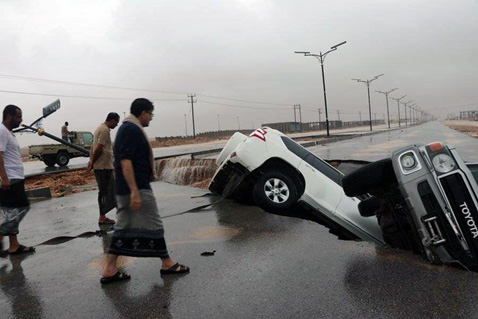 An image of the damage wreaked by Tropical Cyclone Tej on Huswain District, Al Mahrah Governorate, Yemen, taken on 24 October 2023. Photo credit: Emergency operations centre, Al Mahrah GovernorateOn Socotra Island, 2 minor injuries were reported and, fortunately, no deaths. A total of 192 households have been displaced, with 314 houses fully or partially damaged. It is not yet clear how many health facilities have been damaged. Main roads connecting the southern island to Socotra’s centre were affected, limiting access to these areas. Most roads to the town of Hadibu remain closed, with local authorities and medical teams unable to assess the damage.
An image of the damage wreaked by Tropical Cyclone Tej on Huswain District, Al Mahrah Governorate, Yemen, taken on 24 October 2023. Photo credit: Emergency operations centre, Al Mahrah GovernorateOn Socotra Island, 2 minor injuries were reported and, fortunately, no deaths. A total of 192 households have been displaced, with 314 houses fully or partially damaged. It is not yet clear how many health facilities have been damaged. Main roads connecting the southern island to Socotra’s centre were affected, limiting access to these areas. Most roads to the town of Hadibu remain closed, with local authorities and medical teams unable to assess the damage.
Current situation
“WHO and other humanitarian actors are facing many obstacles and funding shortages to identify and respond to multisectoral needs,” said Dr Arturo Pesigan, WHO Representative in Yemen. “The unprepared hospitals in the affected areas will require fuel and medical supplies to enable rapid interventions to contain the surge in demand. Intravenous fluids; antibiotics; laboratory reagents; and medical kits for cholera, dengue and malaria are urgently needed in the affected areas.”
A fuel shortage represents a major problem for hospitals and emergency operations centres. WHO has been able to re-establish the satellite internet service for Al Mahrah emergency operations centre. This is a lifeline as it is the only means of communication available to coordinate the emergency response, given the damage caused by Tropical Cyclone Tej to telecommunications and electricity infrastructure in the area.
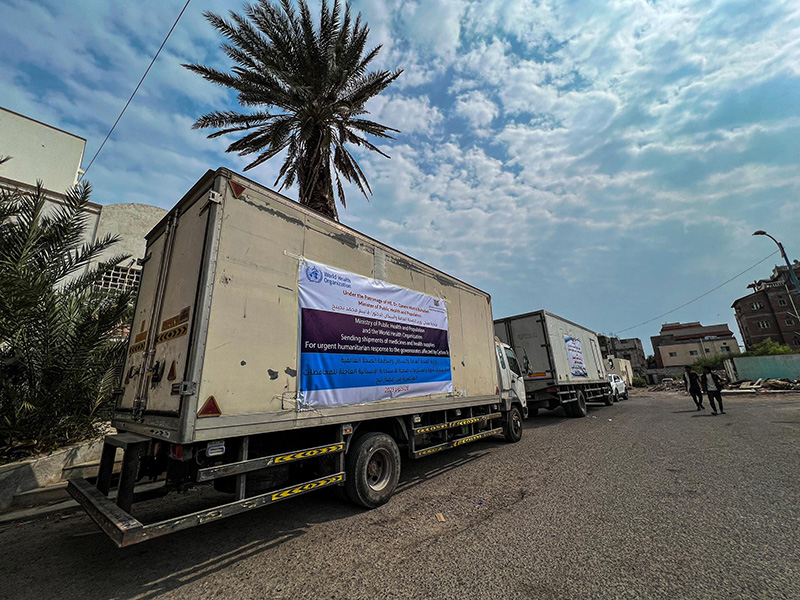 A shipment of medical supplies provided by the Ministry of Public Health and Population and WHO sets off for the affected governorates. Photo credit: WHO/WHO YemenThe WHO-led Health Cluster is mobilizing collective efforts by all Mukalla Hub health partners and coordinating the movement of 3 mobile clinic teams to the affected areas. More than 4100 emergency kits have been dispatched through the Rapid Response Mechanism Cluster to the affected areas in Al Mahrah Governorate. As of 24 October, local authorities in Al Mahrah and Socotra have started to desludge water and open roads.
A shipment of medical supplies provided by the Ministry of Public Health and Population and WHO sets off for the affected governorates. Photo credit: WHO/WHO YemenThe WHO-led Health Cluster is mobilizing collective efforts by all Mukalla Hub health partners and coordinating the movement of 3 mobile clinic teams to the affected areas. More than 4100 emergency kits have been dispatched through the Rapid Response Mechanism Cluster to the affected areas in Al Mahrah Governorate. As of 24 October, local authorities in Al Mahrah and Socotra have started to desludge water and open roads.
Yemen’s Ministry of Public Health and Population, WHO and other partners have been supporting 2 main hospitals, 3 secondary hospitals and 61 public health centres. Additionally, WHO and the Health Cluster have dispatched essential medicines, surgical kits and medical supplies worth approximately US$ 80 000, and basic medical stockpiles have been provided to Socotra Island.
For more information, visit: Yemen Health Emergency
Media contacts: WHO Yemen Communications,
About WHO: Since 1948, the World Health Organization (WHO) has been the United Nations agency dedicated to advancing health for all, so that everyone, everywhere can attain the highest level of health. WHO leads global efforts to expand universal health coverage, direct and coordinate the world’s responses to health emergencies and connect nations, partners and people to promote health, keep the world safe and serve the vulnerable.
Children battle preventable childhood diseases in Yemen as immunization coverage declines
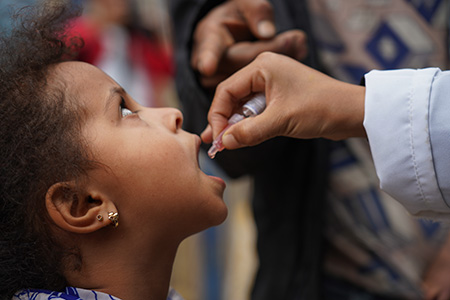 24 October 2023, Sana’a, Yemen – Yemen is facing a significant drop in immunization rates among children. This decline continues to worsen owing to economic deterioration, low incomes, displacement, and overcrowded living conditions in camps, coupled with an overstretched health system. This has led to a resurgence and rise in vaccine-preventable diseases and associated deaths among children in Yemen.
24 October 2023, Sana’a, Yemen – Yemen is facing a significant drop in immunization rates among children. This decline continues to worsen owing to economic deterioration, low incomes, displacement, and overcrowded living conditions in camps, coupled with an overstretched health system. This has led to a resurgence and rise in vaccine-preventable diseases and associated deaths among children in Yemen.
Millions of children cannot be reached by routine immunization activities, and suspected cases of vaccine-preventable diseases have reached unprecedented levels. According to the WHO-UNICEF National Immunization Coverage Estimate for 2022, about one third (27%) of children aged under 1 year in Yemen are not immunized against measles and rubella. Nor have these children received the minimum remaining vaccines required for full protection.
From January to September 2023, 42 400 children in Yemen had measles, and there were 514 associated deaths. In addition, there were about 1400 diphtheria cases and 6000 cases of whooping cough among Yemen’s children.
The re-emergence in Yemen of poliovirus type 1 (cVDPV1), in 2020, was soon followed by the re-emergence of poliovirus type 2 (cVDPV2), in 2021. This has put Yemen back on the world map of 35 countries currently afflicted by this debilitating and incurable disease. So far in 2023, there have been 928 suspected cases among Yemen’s children of acute flaccid paralysis, which can be caused by the poliovirus.
 View Chart 1 in an interactive format“The pattern of immunization levels for all vaccines is declining, especially this year. This has direct and severe health implications for children and for Yemen’s future. The reduced demand by communities and parents for immunization will cause the spread of deadly childhood and infectious diseases, especially those that can be prevented by vaccines,” said Dr Arturo Pesigan, WHO Representative and Head of Mission in Yemen.
View Chart 1 in an interactive format“The pattern of immunization levels for all vaccines is declining, especially this year. This has direct and severe health implications for children and for Yemen’s future. The reduced demand by communities and parents for immunization will cause the spread of deadly childhood and infectious diseases, especially those that can be prevented by vaccines,” said Dr Arturo Pesigan, WHO Representative and Head of Mission in Yemen.
“Yemen’s health system is already overstretched, yet it faces a rapid increase in health emergencies that is beyond its capacity,” added Dr Pesigan. “Health facilities can barely continue to provide basic health services. And with the shortage of international support, many facilities will be forced to shut down operations. This will put millions of vulnerable people in Yemen at imminent risk.”
WHO efforts in Yemen
WHO works closely with Yemen’s Ministry of Public Health and Population and health partners to increase support for routine vaccination interventions. WHO also continues to work within the National Health Framework to provide technical and financial support to improve immunization rates among children.
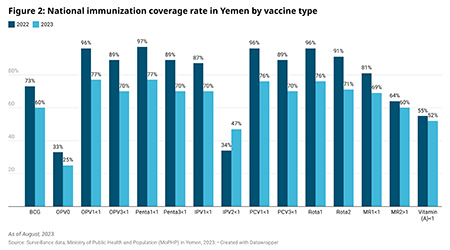 View Chart 2 in an interactive formatThese efforts include work to:
View Chart 2 in an interactive formatThese efforts include work to:
enhance national disease surveillance and data management, ensuring timely detection of cases;
maintain public health teams dedicated to vaccine-preventable diseases;
improve the quality and coverage rates of preventive and outbreak response campaigns;
support the implementation of the equity accelerator proposal to reduce the number of zero-dose children; and
implement integrated vaccination and outreach campaigns.
Since the re-emergence of cVDPV1 and cVDPV2, WHO has closely supported the Ministry of Public Health and Population to develop a polio outbreak response plan; implement outbreak response immunization activities; and intensify surveillance, advocacy and capacity-building efforts.
Learn more about Yemen’s Expanded Programme on Immunization.
For more information, visit: Yemen Health Emergency
Media contacts: WHO Yemen Communications,
About WHO: Since 1948, the World Health Organization (WHO) has been the United Nations agency dedicated to advancing health for all, so that everyone, everywhere can attain the highest level of health. WHO leads global efforts to expand universal health coverage, direct and coordinate the world’s responses to health emergencies and connect nations, partners and people to promote health, keep the world safe and serve the vulnerable.
The overlooked mental health crisis in Yemen
11 October 2023 ‒ In war-torn Yemen, mental health is often neglected. Limited access to mental health services means that only 120 000 of the estimated 7 million people in need of such support receive help.
Aisha’s story
 Aisha Mohammed, a 38-year-old with disabilities, has faced lifelong challenges with speaking and hearing. These difficulties led to her depression, causing her to isolate herself from society. Her sister, Azhar, who shared Aisha’s story, would long to see her sister smile and engage easily in conversations.
Aisha Mohammed, a 38-year-old with disabilities, has faced lifelong challenges with speaking and hearing. These difficulties led to her depression, causing her to isolate herself from society. Her sister, Azhar, who shared Aisha’s story, would long to see her sister smile and engage easily in conversations.
Azhar shared that Aisha’s mental health struggles began in childhood but worsened over time. Despite her family’s efforts to provide a normal life, a traumatic incident at school, in which a teacher insulted and mistreated Aisha, triggered severe depression and social withdrawal. This incident had a profound and lasting impact on Aisha’s physical and mental health.
At first, Aisha’s family thought that what she was going through was solely physical in nature. They sought medical help, but doctors confirmed that her hearing impairment was untreatable. They provided medical earphones, but Aisha broke them during depressive episodes, and the family was unable to afford replacements.
Aisha’s connection to her mother, who provided comfort, was irreplaceable; when her mother died, this deepened Aisha’s depression. Despite her concern for her sister, Azhar hesitated to seek help owing to the fear of community stigma. But after consulting a doctor, she decided to bring Aisha to a WHO-supported mental health unit.
Aisha’s diagnosis of depression led to 4 mental and psychological support sessions, followed by her enrolment in sign language courses at the Deaf and Dumb Association. Here, she discovered others facing similar challenges, and realized that she was not alone.
Two months of seeking mental health support transformed Aisha. She began to make friends and eagerly attend classes, and her communication skills improved significantly.
Azhar shared her joy in witnessing her sister’s transformation. Aisha, once withdrawn and noncommunicative, now aspires to be positive, active and ambitious, bringing a newfound spirit to the family home.








